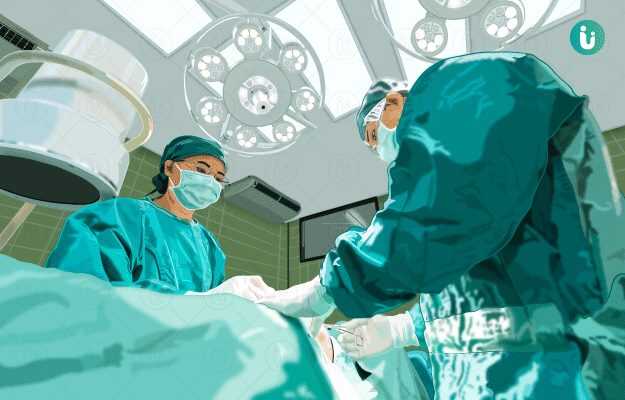Summary
Perineal reconstruction is performed to close a damaged perineum (area between the anus and scrotum or vulva). The damage may be due to cancer in the colorectal, anal, or genitourinary region, trauma, or infections.
The surgery will be performed with general or regional anaesthesia. During the procedure, the surgeon will take skin flaps from a selected region in your body (thigh, groin, abdomen or buttocks), attach the flap on your perineal area, and close the region from where the flap was taken with stitches. After the procedure, the healing will take its time. You may need medications to manage pain, and activities like sitting, and lying down may get affected for some time.
- What is perineal reconstruction?
- Why is perineal reconstruction recommended?
- Who can and cannot get perineal reconstruction?
- What preparations are needed before perineal reconstruction?
- How is perineal reconstruction surgery done?
- How to care for yourself after perineal reconstruction?
- What are the possible complications/risks of perineal reconstruction?
- When to follow up with your doctor after a perineal reconstruction?
What is perineal reconstruction?
Perineal reconstruction is a surgery performed to repair defects in the perineum caused by cancers in the genital, colorectal, or anal region, Paget’s disease, infections, or trauma. Perineum is the region enclosed between the anus and vagina in females and the scrotum and anus in males.
The procedure is done when the defect cannot be closed by sutures (stitches) directly and skin grafts are not feasible due to the high bacterial load that can cause loss of the graft, delayed healing, affect urination and sex due to contractures on the skin.
During perineal reconstruction, the damaged area is closed with the help of flaps taken from the thighs, buttocks, groin, or abdominal region.
The different regions from which a flap can be taken include:
- Gluteal (hip) muscle
- Groin (the fold between the leg and pelvis)
- Different thigh muscles
- Abdominal muscles
Why is perineal reconstruction recommended?
Surgeons recommend perineal reconstruction to correct perineal defects caused due to the following reasons:
- Cancer in the genital, colorectal, or anal region
- Paget’s disease
- Infections such as Fournier’s gangrene
- Trauma
- Radiotherapy damage
- Complications due to urogynaecological implants
Some of the common symptoms of a perineal defect are:
- Bruising
- Open wound and bleeding
- Swelling
- Pain in the abdomen, groin, and genital region
- An object embedded in the perineum
- Inability to urinate
- Blood in the urethral opening
Who can and cannot get perineal reconstruction?
Contraindications for the perineal reconstruction include:
- If the anus (back passage) or urinary opening is too damaged, it may cause difficulty during bowel movements and urinary spraying. Surgeries like urostomy or colostomy may be preferred in such cases. This is a relative contraindication, which means the surgery can be performed, but with caution.
- Different donor flap sites may not be available if past surgeries have taken place at those sites or any future surgery has been planned for that region.
What preparations are needed before perineal reconstruction?
The following preparations are needed for perineal reconstruction:
- You will be asked to share the following details with your doctor:
- Your doctor will conduct a physical examination and ask you to undergo the following tests:
- Chest X-ray
- Blood tests
- Urine tests
- Electrocardiogram (ECG)
- You will be asked to stop having certain medicines like aspirin, vitamin E, and other supplements.
- Make sure to stop smoking a few weeks before the surgery. This will help reduce the complications of the procedure
- Your doctor will ask you to fast after midnight prior to the surgery.
- Arrange for a friend, family member, or responsible adult to drive you home following the surgery.
- You will be asked to sign an approval form if you agree to the procedure.
How is perineal reconstruction surgery done?
Once you reach the hospital, the hospital staff will provide you with a hospital gown. Before the procedure:
- A medicine or special stockings will be given to you. These will help prevent clotting of blood in your legs.
- An intravenous (IV) line will be started in your arm or hand to administer essential medications and fluids during the surgery.
- You will be attached to different devices to check your heart rate, blood pressure, and oxygen levels.
- Antibiotics will be provided to you prior to the perineal reconstruction and also after the surgery to prevent infection.
- You will be given general (makes you fall asleep during the surgery) or regional anaesthesia (numbs the area of operation, but you will be awake).
- A catheter (tube) will be placed in your bladder to drain urine.
- You will lie on a medical table with your legs raised.
In the operation theatre, the following steps are performed for the surgery:
- The surgeon will carefully remove the damaged tissue, note the dimensions of the defect and select the donor area for the flap.
- He/she will study the blood vessels at or around the base of the selected donor area with the help of Doppler ultrasound (an imaging test) and make an incision (cut) in the area to cut out the flap. The flap will contain muscle, connective tissue, and skin.
- First, the surgeon will connect the muscle of the flap to the interior of your pelvic region with the help of sutures (stitches).
- Then, he/she will attach the skin of the flap to the surrounding skin in the perineal region.
- Finally, the surgeon will attach drains in the operated area and close the incision from where the flap was formed.
After the surgery, the medical staff will move you to the recovery room. A member of your healthcare team will monitor your vital signs. Medication to control the pain will be administered to you.
The first few days following the procedure, you will have a liquid diet and then slowly progress on to solid food. You may notice some discharge from your perineal region for was while. This is normal and nothing to worry about. You will be encouraged to move around as soon as possible to encourage your recovery. The drains are generally removed one to two days after the surgery. Your stitches will be removed before your discharge, i.e., 24 to 25 days after the reconstruction.
How to care for yourself after perineal reconstruction?
Once you reach home, you will need to take the following care:
- Pain medication: You will require either prescription (narcotics) or over-the-counter (e.g., paracetamol, ibuprofen) pain medication. This medication will help you to slowly resume your daily activities. You may need to decrease your medication gradually over a few days.
- Driving: Avoid driving if you are on prescription pain medication.
- Diet: Drink a good amount of water and fluids daily, and stick to the dietary guidelines your doctor has given.
- Incision care: Take care of both the incisions (flap donor area and perineal incisions), and regularly check for an infection. Use clean hands to touch your cut. Your perineal incision will take about three months to heal properly.
- Shower: You can take a shower daily. Wash the operated area gently and pat it dry. Consult your doctor before you take a swim or use a bathtub.
- Activities:
- You may be able to walk soon after the operation, but avoid performing strenuous activities like playing sports or jogging for at least six weeks.
- Avoid lifting any heavy weights for one and a half month.
- Due to the location of the incisions, you will not be able to sit for too long, and there may be other restrictions on the way you lie down, sit, and perform some of your normal activities.
- You will be asked to sleep on your side.
- If the flap is taken from the buttock region, there may be some pain while sitting. This will subside as you heal.
When to see the doctor?
You will need to see the doctor in case of the following symptoms:
- Increased vaginal bleeding
- Fever
- Swelling
- Redness at the incision site
- Pain
- Nausea and vomiting
- Difficulty in urinating
- Foul-swelling pus or drainage from the operated area
When to follow up with your doctor after a perineal reconstruction?
Your doctor will schedule a follow-up about one to three weeks after you go home from the hospital to check your progress.
Disclaimer: The above information is provided purely from an educational point of view and is in no way a substitute for medical advice by a qualified doctor.
Find Obstetrician and Gynaecologist in cities
- Obstetrician and Gynaecologist in Bangalore
- Obstetrician and Gynaecologist in Mumbai
- Obstetrician and Gynaecologist in Ghaziabad
- Obstetrician and Gynaecologist in Chennai
- Obstetrician and Gynaecologist in Pune
- Obstetrician and Gynaecologist in Delhi
- Obstetrician and Gynaecologist in Hyderabad
- Obstetrician and Gynaecologist in New Delhi
- Obstetrician and Gynaecologist in Gwalior
- Obstetrician and Gynaecologist in Gurgaon
Surgery Cost In Your City
Doctors for Perineal Reconstruction

Dr. Ayushi Gandhi
Obstetrics & Gynaecology
4 Years of Experience

Dr. Anjali
Obstetrics & Gynaecology
23 Years of Experience

Dr.Anuja Ojha
Obstetrics & Gynaecology
20 Years of Experience

Dr. Geeta Kulkarni
Obstetrics & Gynaecology
7 Years of Experience
References
- Mughal M, Baker RJ, Muneer A, Mosahebi A. Reconstruction of perineal defects. Ann R Coll Surg Engl. 2013 Nov;95(8):539–544. PMID: 24165333.
- National Institute of Diabetes and Digestive and Kidney Diseases [internet]: US Department of Health and Human Services; Perineal Injury in Males
- West bom CM, Talbot SG. An algorithmic approach to perineal reconstruction. Plast Reconstr Surg Glob Open. 2019 Dec;7(12):e2572. PMID: 32537311.
- Brodbeck R, Horch RE, Arkudas A, Beier JP. Plastic and reconstructive surgery in the treatment of oncological perineal and genital defects. Front Oncol. 2015 Oct 8,5:212. PMID: 26500887.
- Memorial Sloan Kettering Cancer Center [Internet]. New York. US; Before Your Surgery
- The American College of Obstetricians and Gynecologists [Internet]. Washington DC. US; Preparing for Surgery
- Niranjan NS, Fox P, Mittermiller P, Lee GK, Evans K, Mushtaq I. Genitourinary and perineal reconstruction. In: Farhadieh RD, Bulstrode NW, Cugno S. Plastic and reconstructive surgery: approaches and techniques. New Jersey: John Wiley & Sons; p. 575–596
- Sung KW, Lee WJ, Yun IS, Lee DW. Reconstruction of large defects in the perineal area using multiple perforator flaps. Arch Plast Surg. 2016 Sep;43(5):446–450. PMID: 27689052.
- UW Health: American Family Children's Hospital [Internet]. Madison (WI): University of Wisconsin Hospitals and Clinics Authority; Caring for Perineal Wounds: Mohs Surgery Clinic
- Thiele JR, Weber J, Neeff HP, Manegold P, Fichtner-Feigl S, et al. Reconstruction of perineal defects: a comparison of the myocutaneous gracilis and the gluteal fold flap in interdisciplinary anorectal tumor resection. Front Oncol. 2020 May;10:668. PMID: 32435617
- Wong DS-Y. Reconstruction of the perineum. Ann Plast Surg. 2014 Sep;73 Suppl 1:S74–S81















